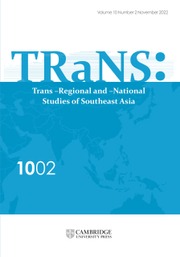In a “Half-dark, Half-light Zone”: Mobility, Precarity, and Moral Ambiguity in Vietnam's Urban Waste Economy
Published online by Cambridge University Press: 22 November 2018
Abstract
This article discusses the everyday practices of a mobile network of migrant waste traders originating from northern Vietnam, locating them in an expanding urban waste economy spanning across major urban centres. Based on ethnographic research, I explore how the expansion of the network is foregrounded by the traders’ dealing with the precarious nature of waste trading, which is rooted in the social ambiguity of waste and migrants working with waste in the urban order. Characterised by waste traders as a “half-dark, half-light zone”, the waste economy is unevenly regulated, made up of highly personalised ties, and relatively hidden from the public. It is therefore rife with opportunities for accumulating wealth, but also full of dangers for the waste traders, whose occupation of marginal urban spaces makes them easy targets of both rent-seeking state agents and rogue actors. While demonstrating resilience, their practices suggest tactics of engaging with power that involve a great deal of moral ambiguity, which I argue is central to the increasing precaritisation of labour and the economy in Vietnam today.
- Type
- Article
- Information
- Copyright
- Copyright © Institute for East Asian Studies, Sogang University 2018
References
- 2
- Cited by




